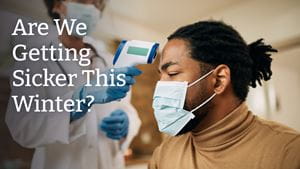
Heading into the first weeks of 2022, hospitals in our region are seeing steady increases in the number of COVID-19 cases and flu cases. Colds, RSVs, and other respiratory infections are making the rounds, as well.
Providers at hospitals, primary care offices, and family medicine practices say there seems to be a growing number of people who are sick – as many as three times as many patients compared to years past at one practice. But just because more people are sick doesn’t mean people are less immune to viruses compared to previous years.
Melissa Bronstein, RN, is the Senior System Director for Infection Prevention for Rochester Regional Health and gives context and answers about public health, illness, and immunity.
Most of the viruses being identified by medical providers through diagnosis and testing this winter are ones we see annually, with the exception of the more recent COVID-19 virus.
This year, providers are seeing influenza and COVID-19, RSV, colds and other upper respiratory infections.
These illnesses usually display a range of similar symptoms, including:
Data from the New York State Department of Public Health shows that the number of flu cases is higher at this point in the season compared to the same point over the last couple years.
Compared to the previous year, the number of COVID-19 cases is significantly higher this season. The dominance of the Omicron variant is the cause for the surge in cases.
The prevalence of the common cold depends on who you ask. One explanation from Ms. Bronstein suggests people were being more careful about general health hygiene last year compared to this year. This means more good hand hygiene, wearing of facemasks, and physical distancing. Those same measures, which were implemented more often in the absence of a widely available COVID-19 vaccine, protected many people against all respiratory illnesses. This year, fewer people are following those measures, which may be contributing to added cases.
“Last year, we didn’t have many viral cases,” Ms. Bronstein said. “So I think that compounds the feeling that there is so much more respiratory illness this year compared to the last two years – not to mention we are more sensitive to respiratory illnesses.”
When discussing our immune systems and their responses to various illnesses, it comes down to whether we have actually been exposed to these types of illnesses.
Our immune systems are capable of remembering how to fight off infections we experienced a long time ago. Our body does not forget how to respond to RSV or the flu. Instead of having lessened immunity to these viruses, we are likely more aware of their existence simply because people are currently being sickened by them.
It is important to consider how other factors play a role in how an individual’s immune system responds to respiratory viruses during difficult times. Some of these factors may include:
Every year, even before the current COVID-19 pandemic, the flu season strained most American health systems. This year is no different.
There are a number of simple ways to protect our individual and collective health. Flu and COVID-19 vaccines help by bolster our immunity to strains that are more harmful than others. While it may not prevent all risk of illness, it will significantly reduce the severity of illness.
Other actions we can all take are:
“Our hospitals are committed to providing excellent patient care,” Ms. Bronstein said. “Anything that we, as a community, can do to keep ourselves well, to bolster our own defenses against infection and doing all the behaviors that we can at home to try to keep ourselves out of the hospitals will serve everybody’s interests.”